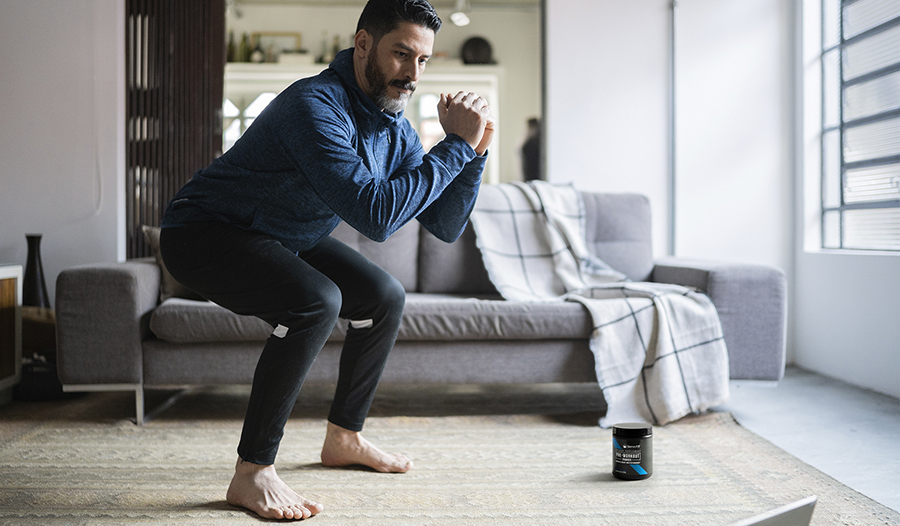Kafein Atletik Performansı Artırabilir mi? İşte Bir Egzersiz Fizyoloğunun Söylemesi Gerekenler

Birçoğumuz günlerimize başlamak için o sabah kupasını almaya uzanıyoruz. Ancak kafeinin uyanmanıza ve tetikte kalmanıza yardımcı olmaktan daha fazlasını yapabileceği ortaya çıktı - atletik performansı artırabilir.
Bu makalede, kafeinin atletik performans üzerindeki etkisi, onu tüketmekten kimin fayda sağlayabileceği, ne kadar ve hangi formu alacağınız ve en iyi sonuçlar için ne zaman alınacağı hakkındaki en acil sorularınızı cevaplayacağız.
Kafein Nedir?
Kafein , merkezi sinir sisteminin, kasların ve diğer organların aktivitesini artıran doğal olarak türetilmiş bir uyarıcıdır. 1 Dünyada en yaygın tüketilen psikoaktif maddedir ve batı ülkelerindeki yetişkinlerin yaklaşık% 90'ı ilacı günlük olarak, tipik olarak kahve, çay veya gazlı içecekler yoluyla tüketir. 2 Araştırmalar, orta dozlarda kafein sağlayabileceğini göstermektedir. Fiziksel ve zihinsel performansı artırarak insan vücudu için birçok fayda. 2,3
Kafein Performansı Nasıl Etkiler?
Kahve severler, kafeinin koşu ve bisiklete binme ve kuvvet antrenmanı egzersizleri gibi dayanıklılık aktivitelerinde atletik performansı önemli ölçüde artırabileceğini duymaktan mutluluk duyacaklardır. Kafein, egzersiz yorgunluğunu azaltırken merkezi sinir sistemini uyararak uyarılma ve canlılığı arttırır.1
Kafein ayrıca ağrı ve efor algısını azaltır.1 Birçok çalışma, egzersizden önce kafein almanın kas gücünü ve dayanıklılığını, koşmayı, zıplamayı, fırlatma performansını ve hem aerobik hem de anaerobik eylemleri artırabileceğini öne sürüyor.2
Fiziksel performansın ötesinde kafein, günlük aktivitelerde ve egzersizlerde size avantaj sağlayabilecek bilişsel işlevi de geliştirir.2 2016 tarihli bir inceleme, kafeinin dikkat, uyanıklığı ve tepki süresini artırdığını ve bunların hepsinin fiziksel performansı artırabileceğini buldu.4
Önemli olarak, kafein alımı her antrenman seviyesindeki kişilerde atletik performansı artırıyor gibi görünüyor.2 Yani, ister seçkin bir sporcu ister acemi bir egzersiz yapan olun, kafein gelişmenize yardımcı olabilir!
Ne Zaman Kafein Almalıyım?
Çok sayıda çalışmayı inceledikten sonra, Uluslararası Spor Beslenme Derneği, egzersizden yaklaşık 60 dakika önce kafein takviyesinin en fazla faydayı sağladığı sonucuna varmıştır.2 Bununla birlikte, antrenmanınızın sonraki aşamalarında kafein tüketmek, daha uzun süreli egzersiz dönemlerinde yorgunlukla mücadeleye yardımcı olabilir.
Çalışmaların yakın tarihli bir incelemesi, kafeinin sporcular daha belirgin yorgunluk zamanlarına yaklaştıklarında performansı daha fazla iyileştirdiğini buldu. Koşu veya bisiklete binme gibi uzun bir yarışta yarışıyorsanız, yarışın sonraki aşamalarında kafein içmeyi bekleyerek daha fazla destek alabilirsiniz.6
Kafeini tüketmenin en etkili zamanı, onu nasıl tükettiğinize bağlıdır. Kafein, bir fincan kahveden kafeinli içeceklere ve hatta kafeinli sakızlara kadar birçok biçimde gelir. Vücudunuz bu ürünlerden gelen kafeini farklı oranlarda emer. Örneğin, vücudunuz kafeini sakızdan kafeinli içeceklerden çok daha hızlı emer.6
Genetik ayrıca vücudunuzun kafeinin etkilerini ne kadar çabuk emdiğini ve hissettiğini de etkileyebilir. En yüksek kafein konsantrasyonları 30 ila 120 dakika arasında değişebilir, bu nedenle fiziksel performansı artırmak için kullanıyorsanız vücudunuzun kafeine bireysel tepkisini izlemek önemlidir.2
Kafein egzersiz performansınızı iyileştirmeye yardımcı olsa da, akşamları egzersiz yaparsanız kafeini atlamak isteyebilirsiniz. Uykunuzu bozmamak için gün içinde olabildiğince erken kafein tüketin.1,2
Kafeinin Kaynakları Nelerdir?
En yaygın kafein kaynakları kahve, çayve alkolsüz içecekler gibi içeceklerdir. Tükettiğimiz kafeinin yaklaşık% 96'sı bu içeceklerden geliyor - ancak bugünlerde piyasada başka birçok kafein ürünü var.2 Egzersiz öncesi içecekler, enerji içecekleri, kafeinli sakız, kafeinli kapsüller, ağız durulamaları, kafeinli enerji barları veya jeller ve burun spreyleri yaygın kafein takviyesi biçimleridir.2
Ne Kadar Kafein En İyisidir?
Çalışmalar, vücut ağırlığının kilogramı başına 3 ila 6 mg kafein veya vücut ağırlığının kilogramı başına 1.4 ila 2.7mg kafein arasındaki dozların egzersiz performansını iyileştirdiğini göstermektedir.2 Örneğin, 154 pound (70 kg) ağırlığındaki bir kişi için önerilen doz egzersizden önce 210 ila 420 mg kafeindir.
Genel olarak konuşursak, atletik performansı artırmak için genellikle yaklaşık 200 mg'lık bir kafein dozu yeterlidir.3 Referans olarak, 8 onsluk bir fincan kahve yaklaşık 90 mg kafein içerir, kafeinli 12 ons soda yaklaşık 35 mg içerir ve çoğu enerji içeceği ve egzersiz öncesi takviyesi 150 ila 300 mg kafein arasında değişebilir.7
Bir takviyenin veya içeceğin kafein içerip içermediğini belirlemek için ek gerçekler paneline bakın. Genellikle etiket kafeini listeler ve dozu sağlar. Yine de kafein sağlayabilecek diğer bileşenler arasında kakao, yeşil kahve çekirdeği, guarana, kola fıstığı, metilksantin, çay, yeşil çay özü, ksantin veya yerba matebulunur.3
Bazı kafein takviyelerinin çok güçlü olabileceğini unutmayın. Saf tozdaki sadece bir çorba kaşığı kafein, yaklaşık 28 fincan kahveye eşdeğer 10 gr (10.000 mg) kafein içerir. 10 ila 14 g arasındaki dozlar toksik olabilir, nöbetlere ve hatta ölüme yol açabilir - bu nedenle kafeini saf toz veya sıvı halde kullanırken dikkatli olun.1,7
Her zaman olduğu gibi, rejiminize yeni takviyeler eklemeden önce doktorunuza veya diğer kalifiye sağlık uzmanlarına danışın.
Çok Fazla Kafein Alabilir misiniz?
Eğer bir kahve aşığıysanız, çok fazla kafeinin zararlı olabileceğini bilmek sizi hayal kırıklığına uğratabilir.
Günlük 500 mg'dan fazla kafein tüketmek, potansiyel uyku bozuklukları nedeniyle fiziksel performansı artırmaktan ziyade azaltabilir.1 Yüksek kafein seviyeleri uykunun kalitesini, süresini ve verimliliğini azaltarak ve uykuya dalmayı zorlaştırarak uykuya dalmayı zorlaştırarak uykuya müdahale edebilir.9 Bu, kronik hafif veya orta derecede uyku yoksunluğuna yol açabilir.
Bu örüntü kulağa şiddetli gelmeyebilir, ancak hafif uyku yoksunluğu bile atletik performansı etkileyebilir.2 Hafif ila orta derecede uyku yoksunluğu iştahı ve vücudun protein, dikkat, öğrenme ve hafızayı nasıl kullandığını değiştirebilir.10 Kaliteli uyku egzersizden zihinsel ve fiziksel iyileşme için gereklidir - onsuz performans büyük ölçüde düşebilir.2
Kafeinin uyku üzerindeki etkisi büyük ölçüde ne zaman tükettiğinize bağlıdır. Kafein tipik olarak yaklaşık 4 ila 6 saatlik bir yarı ömre sahiptir. Pratik olarak, bu, yatmadan yaklaşık altı saat önce kafein tüketmeyi bırakmanız ve ideal olarak uyku bozukluklarından kaçınmak için günün erken saatlerinde tüketmeniz gerektiği anlamına gelir.2
Aşırı kafein uyku kalitesini etkilemenin yanı sıra sinirlilik, kaygı, huzursuzluk, bulantı, kusma, kalp atış hızı artışı ve baş ağrısına da neden olabilir.1,2 Bu yan etkiler egzersiz performansını ve genel refahı olumsuz etkileyebilir, bu nedenle kafein takviyesi yaparken sınırlarınızı bilmek önemlidir.
Kafeinin vücuttaki sıvı dengesini değiştirdiğini duymuş olsanız da, bu yanlıştır.1 Kafein sizi susuz bırakmaz veya ter kaybını artırmaz. Hidrasyon egzersiz yaparken her zaman gereklidir ve kafeinli içecekler sıvı alımına katkıda bulunabilir.
ABD Gıda ve İlaç Dairesi (FDA), günlük 400 mg kafeinin herhangi bir yan etkiye neden olmadığını belirtir. Amerikan Tabipler Birliği (AMA) yetişkinlerin günde 500 mg'dan fazla kafein tüketmemelerini önermektedir.1 Bu yönergeleri akılda tutarak, çoğu yetişkin egzersiz yapmadan önce kafeini güvenli ve etkili bir şekilde kullanabilir.
Herkes Kafein Kullanabilir mi?
Çoğu insan kafeini tolere edebilir, ancak belirli popülasyonlar alımını kısıtlamak isteyebilir.
Amerikan Pediatri Akademisi (AAP), 12 yaşın altındaki çocukların kafeinden uzak durmalarını önermektedir. AAP, 13 yaş ve üstü ergenlerin günde 100 mg'a kadar kafein tüketebileceğini belirtir.11
Amerikan Kadın Hastalıkları ve Doğum Koleji'ne göre, hamile kadınlar günlük 200 mg kafein alımını sınırlamalıdır.11
Bu Yazıdan Çıkarabileceklerimiz
Egzersizleriniz düzgünse, performansınızı artırıp artırmadığını görmek için kafein takviyesi yapmayı düşünün. Sadece günlük 500 mg'dan fazla olmamak üzere alımınızı sınırlamayı ve uykunuzu bozmamak için öğleden sonra kafein kullanmayı bırakmayı unutmayın.
Kahve, egzersiz öncesi takviyeler veya kafeinli diş etleri veya jeller, atletik performansınızı artırmaya yardımcı olacak kadar güçlü dozlara sahip olması gereken popüler kafein formlarıdır. FDA'ya göre, kafein egzersizlerinizi iyileştirmeye yardımcı olmak için günlük olarak güvenli ve etkili bir şekilde kullanılabilir.
Referanslar:
- Diyet takviyeleri ofisi - egzersiz ve atletik performans için diyet takviyeleri. NIH Diyet Takviyeleri Ofisi. https://ods.od.nih.gov/factsheets/ExerciseAndAthleticPerformance-HealthProfessional/#caffeine. 2 Haziran 2022'de yayınlandı. Erişim tarihi: 15 Ağustos 2022.
- Misafir NS, VanDusseldorp TA, Nelson MT, vd. Uluslararası spor beslenme derneği pozisyon standı: kafein ve egzersiz performansı. J Int Soc Spor Nutr. 2021; 18 (1) :1. Yayın tarihi 2021 Ocak 2. doi:10.1186/s12970-020-00383-4
- Performans için kafein. Operasyon Ek Güvenliği. https://www.opss.org/article/caffeine-performance. 30 Nisan 2022'de yayınlandı. Erişim tarihi: 15 Ağustos 2022.
- McLellan TM, Caldwell JA, Lieberman HR. Kafeinin bilişsel, fiziksel ve mesleki performans üzerindeki etkilerinin gözden geçirilmesi. Neurosci Biobehav Rev. 2016; 71:294-312. doi: 10.1016/j.neubiorev.2016.09.001.
- Shen JG, Brooks MB, Cincotta J, Manjourides JD. Kafeinin etkisi ile dayanıklılık atletik zaman deneme olaylarının süresi arasında bir ilişki kurmak: sistematik bir inceleme ve meta-analiz. J Sci Med Spor. 2018.
- Kamimori GH, Karyekar CS, Otterstetter R, Cox DS, Balkin TJ, Belenky GL, vd. Normal sağlıklı gönüllülere kapsüllere karşı sakızda uygulanan kafeinin emilim oranı ve nispi biyoyararlanımı. Int J Pharm. 2002; 234 (1—2): 159—167. doi: 10.1016/S0378-5173 (01) 00958-9.
- Fasulyeleri dökmek: Ne kadar kafein çok fazla? ABD Gıda ve İlaç Dairesi. https://www.fda.gov/consumers/consumer-updates/spilling-beans-how-much-caffeine-too-much. 12 Aralık 2018'de yayınlandı. Erişim tarihi: 15 Ağustos 2022.
- Antrenman öncesi yapmak gerçekten işe yarıyor mu? Cleveland Kliniği. https://health.clevelandclinic.org/does-taking-a-pre-workout-actually-work/. 10 Eylül 2020'de yayınlandı. Erişim tarihi: 15 Ağustos 2022.
- Clark I, Landolt HP. Kahve, kafein ve uyku: epidemiyolojik çalışmaların ve randomize kontrollü çalışmaların sistematik bir incelemesi. Sleep Med Rev. 2017; 31:70-78. doi: 10.1016/j.smrv.2016.01.006.
- Halson SL, Juliff LE. Uyku, spor ve beyin. Prog Brain Res. 2017; 234:13-31. doi: 10.1016/bs.pbr.2017.06.006.
- Kafein. Beslenme Kaynağı. https://www.hsph.harvard.edu/nutritionsource/caffeine/. 12 Kasım 2020'de yayınlandı. Erişim tarihi: 15 Ağustos 2022.
FERAGAT:SAĞLIK MERKEZİ tanı koymayı hedeflememektedir...
















































































 İçindekiler
İçindekiler


